Mitsubishi Space Star vs Suzuki Jimny – Differences & prices compared
Compare performance, boot space, consumption and price in one view.
Find out now: which car is the better choice for you – Mitsubishi Space Star or Suzuki Jimny?
The Mitsubishi Space Star (Hatchback) comes with a Petrol engine and Manuel or Automatic transmission. In comparison, the Suzuki Jimny (Off-Roader) features a Petrol engine with Manuel transmission.
When it comes to boot capacity, the Mitsubishi Space Star offers 235 L, while the Suzuki Jimny provides – depending on how much space you need. If you’re looking for more power, decide whether the 71 HP of the Mitsubishi Space Star or the 102 HP of the Suzuki Jimny suits your needs better.
In terms of consumption, the values are 4.90 L per 100 km for the Mitsubishi Space Star, and 7.70 L for the Suzuki Jimny.
Price-wise, the Mitsubishi Space Star starts at 11600 £, while the Suzuki Jimny is available from 25300 £. Compare all the details and find out which model fits your lifestyle best!
Mitsubishi Space Star
The Mitsubishi Space Star offers a compact yet surprisingly spacious experience, making it an ideal choice for urban dwellers who need agility and comfort. Its sleek design is complemented by a range of vibrant colour options, adding a touch of flair to everyday commutes. With a focus on efficiency and practicality, the Space Star combines a user-friendly interface with modern technology to ensure a smooth driving experience.
details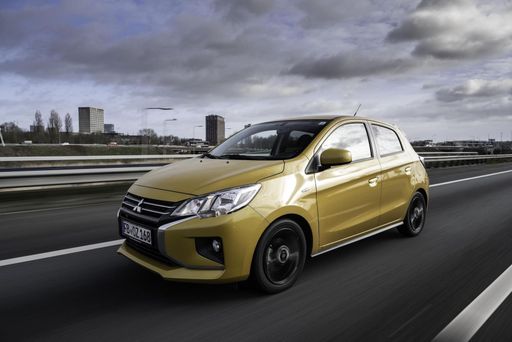 @ presse.mitsubishi-motors.de
@ presse.mitsubishi-motors.de
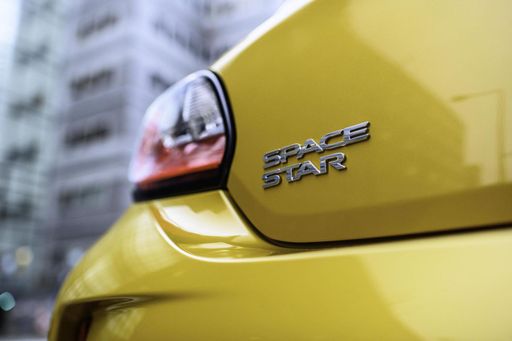 @ presse.mitsubishi-motors.de
@ presse.mitsubishi-motors.de
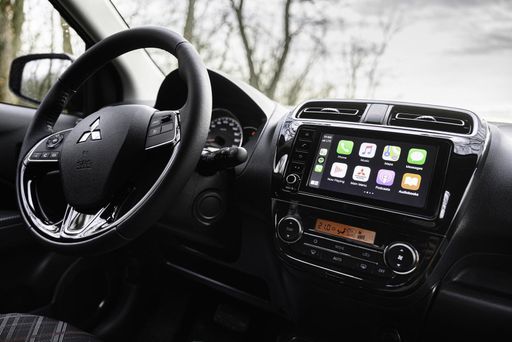 @ presse.mitsubishi-motors.de
@ presse.mitsubishi-motors.de
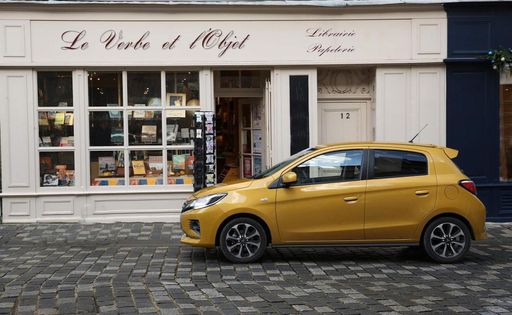 @ presse.mitsubishi-motors.de
@ presse.mitsubishi-motors.de
Suzuki Jimny
The Suzuki Jimny is a compact SUV that has gained a loyal following for its rugged charm and off-road capabilities. Its boxy design is both nostalgic and functional, making it stand out in a sea of more streamlined vehicles. Despite its small size, the Jimny offers a surprisingly robust driving experience, ideal for adventurous journeys off the beaten track.
details @ suzuki.at
@ suzuki.at
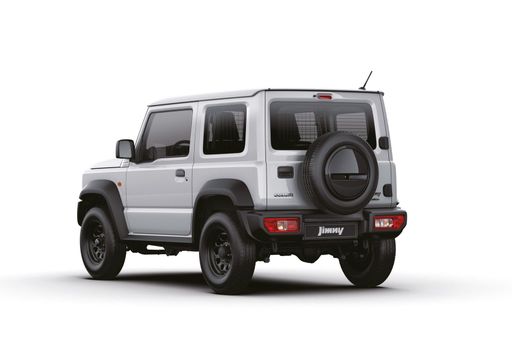 @ suzuki.at
@ suzuki.at
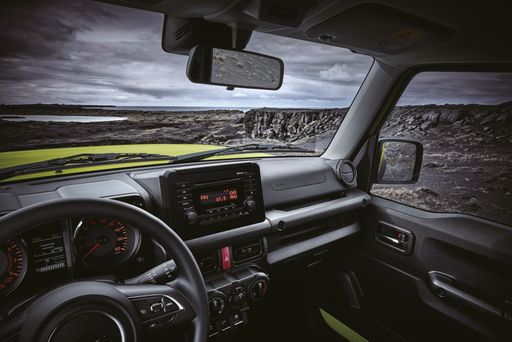 @ suzuki.at
@ suzuki.at
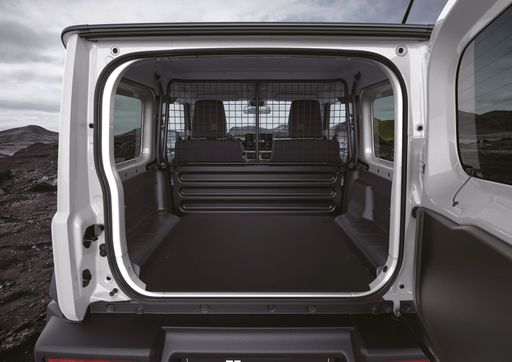 @ suzuki.at
@ suzuki.at

|

|
|
|
|
Costs and Consumption |
|
|---|---|
|
Price
11600 - 18700 £
|
Price
25300 - 27700 £
|
|
Consumption L/100km
4.9 - 5.5 L
|
Consumption L/100km
7.70 L
|
|
Consumption kWh/100km
-
|
Consumption kWh/100km
-
|
|
Electric Range
-
|
Electric Range
-
|
|
Battery Capacity
-
|
Battery Capacity
-
|
|
co2
112 - 125 g/km
|
co2
173 g/km
|
|
Fuel tank capacity
35 L
|
Fuel tank capacity
40 L
|
Dimensions and Body |
|
|---|---|
|
Body Type
Hatchback
|
Body Type
Off-Roader
|
|
Seats
5
|
Seats
2
|
|
Doors
5
|
Doors
3
|
|
Curb weight
940 - 1009 kg
|
Curb weight
1165 kg
|
|
Trunk capacity
209 - 235 L
|
Trunk capacity
-
|
|
Length
3845 mm
|
Length
3645 mm
|
|
Width
1665 mm
|
Width
1645 mm
|
|
Height
1505 mm
|
Height
1705 mm
|
|
Payload
360 - 400 kg
|
Payload
270 kg
|
Engine and Performance |
|
|---|---|
|
Engine Type
Petrol
|
Engine Type
Petrol
|
|
Transmission
Manuel, Automatic
|
Transmission
Manuel
|
|
Transmission Detail
Manual Gearbox
|
Transmission Detail
Manual Gearbox
|
|
Drive Type
Front-Wheel Drive
|
Drive Type
All-Wheel Drive
|
|
Power HP
71 HP
|
Power HP
102 HP
|
|
Acceleration 0-100km/h
14.1 - 15.8 s
|
Acceleration 0-100km/h
12.80 s
|
|
Max Speed
163 - 167 km/h
|
Max Speed
145 km/h
|
|
Torque
102 Nm
|
Torque
130 Nm
|
|
Number of Cylinders
3
|
Number of Cylinders
4
|
|
Power kW
52 kW
|
Power kW
75 kW
|
|
Engine capacity
1193 cm3
|
Engine capacity
1462 cm3
|
General |
|
|---|---|
|
Model Year
2020 - 2022
|
Model Year
2021 - 2024
|
|
CO2 Efficiency Class
C, D
|
CO2 Efficiency Class
F
|
|
Brand
Mitsubishi
|
Brand
Suzuki
|
Mitsubishi Space Star
Introducing the Mitsubishi Space Star: A Perfect Blend of Efficiency and Innovation
The Mitsubishi Space Star continues to impress urban drivers with its compact yet efficient design. Celebrated for its practicality and fuel economy, this hatchback offers a unique blend of new-age technology and reliable performance. Let’s dive into some of the technical details and innovations that make the Space Star a popular choice among compact car enthusiasts.
Engine and Performance
The Space Star is powered by a 1.2-litre, 3-cylinder petrol engine, delivering a respectable 71 PS (52 kW). The engine provides a harmonious balance of power and efficiency, reaching a top speed of up to 167 km/h. With a torque of 102 Nm, drivers can expect smooth city rides and decent highway cruising capabilities. The Space Star's economy ranges from 4.9 to 5.5 litres per 100 kilometres, ensuring that your journeys remain budget-friendly and environmentally considerate.
Transmission and Driving Dynamics
When it comes to the driving experience, buyers have the option of a 5-speed manual transmission or a CVT automatic. This flexibility allows for a more personalised driving experience, whether you prefer the engagement of manual shifting or the convenience of an automatic gearbox. The car's front-wheel-drive setup further enhances its maneuverability, making it an ideal companion for navigating tight city streets.
Design and Dimensions
The Mitsubishi Space Star is designed to turn heads with its sleek, aerodynamic lines while maintaining a practical size. Measuring 3845 mm in length, 1665 mm in width, and 1505 mm in height, it's a perfect fit for urban driving. Despite its compact form, the Space Star offers five seats and five doors, providing ample accessibility and comfort for both the driver and passengers.
Interior Features and Comfort
Inside, the Space Star prioritises comfort and convenience with thoughtfully designed interiors. The luggage space ranges from 209 to 235 litres, ideal for shopping trips or weekend getaways. The vehicle comes in a variety of trim levels, including Basis, Plus, Select, and Top, with each offering distinct features to meet different customer needs. Whether you need basic amenities or more premium touches, the Space Star has a version that will suit your lifestyle.
Safety and Environmental Impact
Safety innovation is a hallmark of the Mitsubishi Space Star, ensuring peace of mind for drivers and passengers alike. Its CO2 efficiency class ranges from C to D, with emissions between 112 to 125 g/km, reflecting its dedication to reducing the environmental footprint. These features contribute to making the Space Star a responsible choice for the eco-conscious driver.
Cost of Ownership
Affordability is another attractive aspect of the Space Star. Prices range from €13,590 to €21,790, making it accessible for a wide array of budgets. Running costs are equally competitive, with monthly expenses estimated between €627 and €767, and cost per kilometre ranging from 25.1 to 30.7 cents, all contributing to a car that is as economical to own as it is to drive.
Conclusion
In summary, the Mitsubishi Space Star offers a compelling package of efficiency, practicality, and modern technology. Its combination of fuel economy, flexible transmission options, and affordability make it a standout choice in the compact car segment. For those looking for a reliable and economical city car, the Space Star remains a strong contender that shouldn't be overlooked.
Suzuki Jimny
Revamping Tradition with Modern Twists: The Suzuki Jimny
The Suzuki Jimny continues its legacy as a robust compact off-roader, seamlessly blending its iconic design with modern technological advancements. Whether traversing rugged terrains or cruising urban streets, the Jimny stands out as a versatile companion.
A Legacy Reimagined: Design and Build
Suzuki stays true to its roots with the Jimny's classic square silhouette. This three-door compact SUV is not just about aesthetics; its dimensions—with a length of 3645 mm, a width of 1645 mm, and a height of 1705 mm—are designed to tackle off-road challenges effortlessly. With its compact build, the Jimny fits snugly into city parking spots whilst still radiating an aura of toughness.
The Heart of the Machine: Engine and Performance
Powered by a 1.5-litre four-cylinder engine, the Jimny delivers 102 PS and 130 Nm of torque. Its petrol engine is paired with a manual transmission, offering drivers a more connected and tactile driving experience. With a fuel consumption of 7.7 L/100km, it strives to balance power and efficiency. The Jimny's maximum speed peaks at 145 km/h, while it accelerates from 0 to 100 km/h in 12.8 seconds, a testament to its steadfast performance in its category.
Mastering Terrains with ALLGRIP PRO
One of the standout features of the Jimny is its ALLGRIP PRO all-wheel-drive system, designed for serious off-roaders. This technology provides the driver with the ability to switch between 2WD and 4WD at the flick of a switch, ensuring maximum traction no matter the condition. The elevation of its chassis and its tough underbody protection mean the Jimny can handle rough landscapes with relative ease.
Comfort Meets Functionality: Interior Features
Step inside, and you'll find an interior that perfectly balances utility and comfort. The Jimny might be a two-seater, but its thoughtful design ensures ample space for both driver and passenger. The dashboard is simple yet functional, equipped with essential features that accentuate the driving experience without unnecessary distractions.
The Green Concerns: Environmental Impact
While the Jimny offers impressive off-road capabilities, its CO2 emissions stand at 173 g/km, placing it within efficiency class F. This is an area where environmentally conscious buyers might seek further innovation from Suzuki. Despite this, the Jimny remains a preferable choice for those who value performance over emission metrics.
Balancing Act: Cost and Affordability
Priced between €29,490 and €32,340, the Jimny positions itself within a competitive market segment. Potential owners will be making a modest investment for a vehicle that promises both durability and versatility. With monthly costs estimated at €940 and €0.376 per kilometre, it remains an affordable option for those who prioritise capability over luxury.
In Conclusion: A Symbol of Reliability
The Suzuki Jimny is more than just a car; it’s a lifestyle choice for adventurers who refuse to conform to the ordinary. With years of trust behind it, the Jimny has successfully adapted to the needs of the modern driver without compromising its rugged essence. Whether you're scaling new heights or navigating city landscapes, the Jimny proves itself a worthy companion on any road less travelled.
Which drive types are available for the Mitsubishi Space Star?
Available as Front-Wheel Drive.
The prices and data displayed are estimates based on German list prices and may vary by country. This information is not legally binding.
